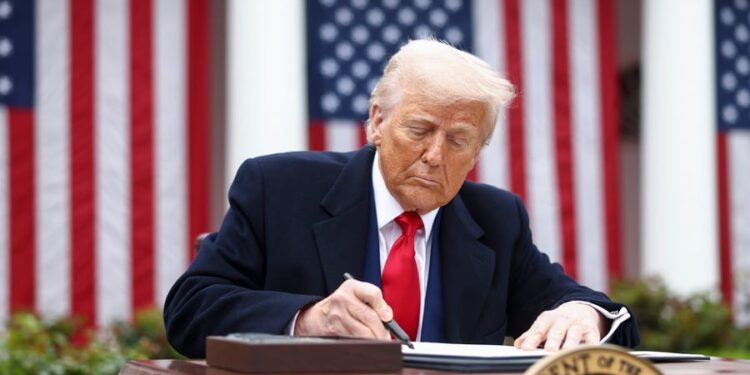A new 10% tariff comes into effect today on a significant range of products imported into the U.S. from nearly all over the world, following a decision by President Donald Trump, which is expected to have substantial repercussions on global trade.
This tariff, which exempts certain items — such as oil, natural gas, gold, copper, silver, palladium, construction timber, semiconductors, pharmaceuticals, and minerals that are not available in the U.S. — will be added to existing tariffs.
The new tariffs do not apply to steel, aluminum, and imported automobiles that have already been subjected to a 25% tariff.
The impact will also be greater for countries exporting more to the U.S. than they import, effective April 9.
Tariffs on imports from China will reach 54%, those from the EU will be set at 20%, tariffs on Vietnam will be 46%, and those from Japan will be 24%.
An official document presented by the U.S. government on Friday indicates that the new tariffs will affect about 80 countries and regions, including the 27 member countries of the EU.
Penguins Keep Their Exemption
Interestingly, the islands of Heard and McDonald in the Antarctic region have been removed from the official list, where Trump had initially suggested tariffs would be imposed despite being uninhabited by humans.
The United Nations Conference on Trade and Development (UNCTAD) voiced concern on Friday regarding the inclusion of some of the world’s poorest nations in the U.S. tariff list.
UNCTAD highlighted that the least developed countries and small developing island states account for only 1.6% and 0.4%, respectively, of the U.S. trade deficit.
“National Emergency”
President Trump defended his decision for additional tariffs on imported products to the U.S. on Wednesday, citing a “national emergency” to reduce the U.S. deficit.
According to economists, the tariff barriers announced by the Republican leader will be as high as those imposed during the 1930s, a time when global trade was less developed and nations depended less on production from other countries.
China has already responded, announcing a 34% additional tariff on U.S. imports effective April 10, escalating the trade war, with other countries expected to follow suit.
While the European Union has yet to announce retaliatory measures against the new 20% customs tariffs imposed by Trump, such announcements are anticipated soon. Simultaneously, the EU reiterates its intention to engage in “serious negotiations” with Washington.
Markets Collapse
Meanwhile, the markets are taking a severe hit. A staggering $6 trillion was wiped off the U.S. stock market in just two days, with European and Asian markets also plummeting.
“My policies will never change,” Trump responded in an all-caps post on Truth Social. “This is a good time to get rich, richer than ever!!!” he added emphatically.
Furthermore, Trump urged Federal Reserve Chairman Jerome Powell to lower interest rates, claiming it is “the perfect” time given improvements in specific prices (like oil and eggs) since his return to the White House in January.
However, just moments later, Powell painted a grim outlook for the U.S. economy following the new tariffs: potentially higher inflation, slower growth, and increased unemployment.
UN: Increase in Tariffs “Harms the Vulnerable and Poor”
The rise in global tariffs initiated by Trump will “hit the vulnerable and the poor” the hardest, criticized Rebecca Greenspan, Secretary-General of the United Nations Conference on Trade and Development (UNCTAD).
“It is time for cooperation, not escalation,” Greenspan added, emphasizing that “the rules of global trade must evolve to address today’s challenges in a way that prioritizes predictability and growth, protecting those most vulnerable.”
From nearly 200 U.S. trading partners, about ten account for around 90% of the trade deficit, noted UNCTAD in a released statement.
Despite accounting for 1.6% and 0.4% of the current U.S. trade deficit, respectively, the least economically developed countries and small island nations are disproportionately affected by the tariffs announced by Trump on April 2 — in many instances, they are very harsh, applied to a widespread range of countries, based on calculations that have left many economists baffled.
These impoverished nations “will neither balance the (U.S.) trade deficit nor generate significant revenue,” UNCTAD stressed.
“Many low-income economies now face a ‘perfect storm’ of worsening external conditions, unsustainable debts, and slowing growth,” the UN trade and development agency continued.
They also warned about the negative impacts on the global economy.
In a world with low growth and high debt, the rise in tariffs poses a risk of reducing investments and trade flows, adding uncertainty to an already fragile environment,” the statement read.
“This could undermine confidence, slow investments, and threaten developmental gains, particularly in the most vulnerable countries.”
Source: APE-MPE- AFP

















